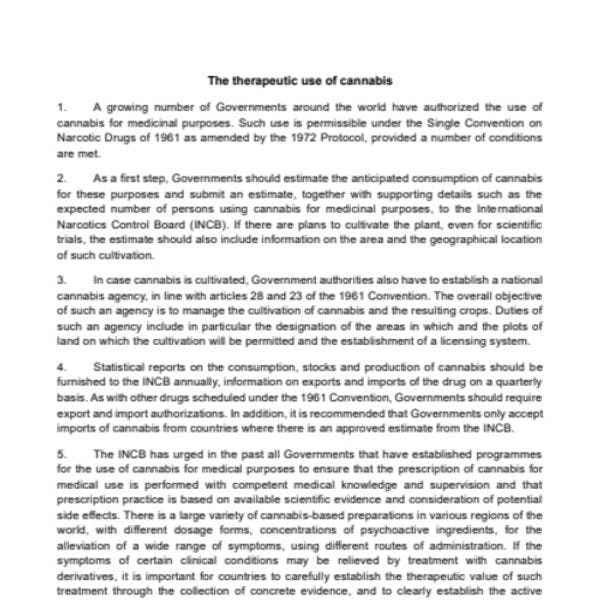INCB แจ้งเตือน: การใช้กัญชาในการรักษา
เขียนโดย คณะกรรมการควบคุมยาเสพติดระหว่างประเทศ (INCB)
1. รัฐบาลทั่วโลกได้เริ่มอนุญาตให้มีการใช้กัญชาเพื่อใช้ในทางการแพทย์ การใช้ดังกล่าวได้รับอนุญาตภายใต้อนุสัญญาฉบับเดียวว่าด้วยเรื่องยาเสพติดของปีพ. ศ. 2504 ซึ่งแก้ไขเพิ่มเติมโดยพิธีสาร พ.ศ. 2515 ตามเงื่อนไขต่างๆ
2. ในขั้นตอนแรกรัฐบาลควรคาดการณ์การบริโภคกัญชาที่คาดว่าจะเกิดขึ้นเพื่อวัตถุประสงค์ดังกล่าวและจัดทำประเมินความพร้อมกับรายละเอียดที่สนับสนุนเช่นจำนวนคนที่คาดว่าจะใช้กัญชาเพื่อวัตถุประสงค์ในการรักษาโรคให้กับคณะกรรมการควบคุมยาเสพติดแห่งชาติ (INCB) ได้ทราบ หากมีแผนการปลูกพืช สามารถทำเพื่อการทดลองทางวิทยาศาสตร์ได้ และต้องประเมินถึงข้อมูลเกี่ยวกับพื้นที่และที่ตั้งทางภูมิศาสตร์ของการเพาะปลูกเช่นกัน
3. ในกรณีที่มีการเพาะปลูกกัญชา หน่วยงานของรัฐต้องจัดตั้งหน่วยงานกัญชาแห่งชาติตามมาตรา 28 และมาตรา 23 ของอนุสัญญา 1961 วัตถุประสงค์โดยรวมของหน่วยงานดังกล่าวคือการจัดการการเพาะปลูกกัญชาและพืชผล หน้าที่ของหน่วยงานดังกล่าว ได้แก่ การกำหนดเขตพื้นที่และที่ดินที่จะต้องได้รับอนุญาตและการจัดตั้งระบบการออกใบอนุญาต
4. ต้องมีการทำรายงานสถิติเกี่ยวกับการบริโภคหุ้นและการผลิตกัญชาควรจัดให้ INCB เป็นประจำทุกปีข้อมูลเกี่ยวกับการส่งออกและนำเข้ายาเป็นรายไตรมาส เช่นเดียวกับยาอื่นที่กำหนดไว้ภายใต้อนุสัญญา 1961 รัฐบาลควรกำหนดให้มีการอนุมัติการส่งออกและนำเข้า นอกจากนี้ขอแนะนำให้รัฐบาลยอมรับเฉพาะการนำเข้ากัญชาจากประเทศที่มีการประมาณการที่ได้รับอนุมัติจาก INCB
5. INCB ได้เรียกร้องในอดีตรัฐบาลทั้งหมดที่มีโครงการจัดตั้งกัญชาขึ้นเพื่อใช้ในทางการแพทย์เพื่อให้แน่ใจว่าใบสั่งยาของกัญชาใช้ในทางการแพทย์มีการดำเนินการด้วยความรู้ความสามารถทางการแพทย์และการกำกับดูแลและการปฏิบัติตามใบสั่งแพทย์จะใช้ข้อมูลทางวิทยาศาสตร์ที่มีอยู่ หลักฐานและการพิจารณาถึงผลข้างเคียงที่อาจเกิดขึ้น มีการเตรียมกัญชาหลากหลายรูปแบบในภูมิภาคต่างๆของโลกโดยมีรูปแบบยาที่แตกต่างกันความเข้มข้นของส่วนผสมทางจิตเพื่อบรรเทาอาการที่หลากหลายโดยใช้วิธีการบริหารที่แตกต่างกัน ถ้าอาการของเงื่อนไขทางคลินิกบางอย่างอาจจะโล่งใจโดยการรักษาด้วยอนุพันธ์ของกัญชาเป็นสิ่งสำคัญสำหรับประเทศที่จะต้องมีการกำหนดมูลค่าของการรักษาดังกล่าวอย่างรอบคอบโดยการรวบรวมหลักฐานที่เป็นรูปธรรมและเพื่อกำหนดหลักการที่ใช้งานและปริมาณที่จะใช้อย่างชัดเจน .
6. องค์การอนามัยโลกซึ่งเป็นหน่วยงานด้านการแพทย์ระหว่างประเทศชั้นนำกำลังอยู่ในระหว่างการทบทวนประโยชน์ของกัญชารวมถึงความรับผิดชอบต่อการถูกละเมิดและความรับผิดชอบการสาธารณสุขและศักยภาพในการทำร้ายสังคม ผลการตรวจสอบจะเป็นที่ทราบกันดีในช่วงเวลาที่กำหนด
สมัครสมาชิก แจ้งข่าว IDPC ทุกเดือน เพื่อรับข้อมูลเกี่ยวกับประเด็นที่เกี่ยวข้องกับนโยบายยาเสพติด
กรุณาดูด้านล่างสำหรับข้อมูลเพิ่มเติมเป็นภาษาอังกฤษ
1. A growing number of Governments around the world have authorized the use of cannabis for medicinal purposes. Such use is permissible under the Single Convention on Narcotic Drugs of 1961 as amended by the 1972 Protocol, provided a number of conditions are met.
2. As a first step, Governments should estimate the anticipated consumption of cannabis for these purposes and submit an estimate, together with supporting details such as the expected number of persons using cannabis for medicinal purposes, to the International Narcotics Control Board (INCB). If there are plans to cultivate the plant, even for scientific trials, the estimate should also include information on the area and the geographical location of such cultivation.
3. In case cannabis is cultivated, Government authorities also have to establish a national cannabis agency, in line with articles 28 and 23 of the 1961 Convention. The overall objective of such an agency is to manage the cultivation of cannabis and the resulting crops. Duties of such an agency include in particular the designation of the areas in which and the plots of land on which the cultivation will be permitted and the establishment of a licensing system.
4. Statistical reports on the consumption, stocks and production of cannabis should be furnished to the INCB annually, information on exports and imports of the drug on a quarterly basis. As with other drugs scheduled under the 1961 Convention, Governments should require export and import authorizations. In addition, it is recommended that Governments only accept imports of cannabis from countries where there is an approved estimate from the INCB.
5. The INCB has urged in the past all Governments that have established programmes for the use of cannabis for medical purposes to ensure that the prescription of cannabis for medical use is performed with competent medical knowledge and supervision and that prescription practice is based on available scientific evidence and consideration of potential side effects. There is a large variety of cannabis-based preparations in various regions of the world, with different dosage forms, concentrations of psychoactive ingredients, for the alleviation of a wide range of symptoms, using different routes of administration. If the symptoms of certain clinical conditions may be relieved by treatment with cannabis derivatives, it is important for countries to carefully establish the therapeutic value of such treatment through the collection of concrete evidence, and to clearly establish the active principles and the dosages to be used.
6. The World Health Organization, the leading international medical authority is currently in the process of reviewing the therapeutic usefulness of cannabis as well as its abuse and dependence liability, public health and social harm potential. The results of its review will become known in due course.
Click here to read the full article.
Keep up-to-date with drug policy developments by subscribing to the IDPC Monthly Alert.
Thumbnail: INCB
